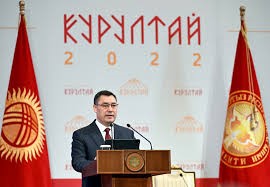Kyrgyzstan's new Constitution
With early parliamentary elections scheduled for 30 November, President Žaparov would like to hold a referendum on certain amendments to the Constitution, including the reintroduction of the death penalty for heinous crimes against women and children. The vote will take place according to new rules that reserve 30% of seats for female representation.
Bishkek (AsiaNews) - Kyrgyzstan's President Sadyr Žaparov has declared his intention to reinstate the death penalty in response to recent heinous crimes against minors and women. The proposal could be put to a vote in a referendum to be held simultaneously with the early parliamentary elections on 30 November, paving the way for a comprehensive review of the constitution.
The decision was inspired by the tragic case of the murder of minor Ajsuluu Mukaševa in Issyk-Kul, whose investigation is under the direct control of the president, as announced by spokesman Askat Alagozov.
According to the statement, Žaparov has given instructions to prepare legislative changes regarding the reintroduction of the death penalty for violence and murder against women and children, cases that “must not go unpunished”. Kyrgyzstan is at the forefront of granting political representation to women, but the percentage of violence against women and children remains very high in the country.
These contradictory situations have prompted the president to move forward with the proposed amendments, and unfortunately, the murder of the 17-year-old girl is not an isolated case in recent times.
The reactions of the population, especially on social media, are pushing for more severe punishment for those guilty of such situations, ‘without giving in to humanitarian illusions on the part of the state,’ as stated by political scientist Igor Šestjakov, director of the Oj Orlo analysis centre.
Ajsuluu's murder has had much more resonance in Kyrgyz society than the parliamentary elections themselves, which should open the way to much more direct popular participation without corruption and vote trading.
In the next parliament, a minimum quota of 30% is reserved for women, but it will be necessary to verify whether this choice is reflected in the voters' votes, considering also that each candidate will have to pay the fees for participating in the elections out of their own pocket.
As Šestjakov comments, ‘what matters is not so much the presence of female representatives able to cover the costs, but above all that of highly professional people with an adequate understanding of the needs of the state, then the choice will make logical sense’.
On his social media pages, where he is always very active, Žaparov denied the widespread opinion that the parliamentary self-dissolution was his idea, ‘even if opponents think that it is just a preparation for the presidential elections that will take place in a year's time... No, dear compatriots, I did not put pressure on any MP’. He states that if he runs for president again, after being elected five years ago with 80% of the vote, ‘I am quite sure I will exceed 90%, I feel the support of the people much more than before’, closing the door on speculation about a handover to the other major player on the Kyrgyz public scene, the head of the Security Committee Kamchybek Tashiev.
The elections will be held according to new rules, which came into force last June, with thirty multi-member seats in the territorial districts, in each of which three MPs will be elected, one of whom must be female.
The parliament is expected to be very much oriented towards the reforms proposed by the president and his team of close associates, which will in any case strengthen the centrality of the presidential figure itself, overshadowing even the role of the ruling party.
However, the candidates do not have an easy task, as they must not only meet all the registration requirements, but also conduct an election campaign without being able to take advantage of funding outside the conditions of state control. Just over 30% of the entire electorate participated in the last political vote, and it is now hoped that a much higher percentage will participate, and not only because of the emotional impact of social dramas.







.png)










